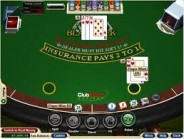
Break the One-Armed Bandits
More False Assumptions About Casinos
In this two-part article, I discuss 20 assumptions held by a multitude of casino players, many handed down by tradition and authority that are indeed false, illogical, dangerous and dumb. We continue Frank Scoblete is the one of the most popular gaming authors in America. He has released sixteen books, three audiotapes, three videotapes, and his own imprint, the Scoblete Get-the-Edge Guides. Frank's website is www.goldentouchcraps.com with #11-20.
Frank Scoblete is the one of the most popular gaming authors in America. He has released sixteen books, three audiotapes, three videotapes, and his own imprint, the Scoblete Get-the-Edge Guides. Frank's website is www.goldentouchcraps.com with #11-20.
Assumption #11: The pit boss always ignores me when I want to get his attention.
On occasion, a pit boss might purposely ignore a player, if that player is obnoxious, loud, drunk, or otherwise a ploppy. But most of the time when you think you are being ignored, you aren’t. If that pit boss, or floorperson, is at the computers, it probably means he or she is checking on a comp or a rating. One pit boss, one floorperson, is in charge of many tables and they do have many responsibilities. Chances are they don’t see you waving. When they do, they’ll usually say, “I’ll be right with you.” In such cases, patience is a virtue. One caveat to the above. If you are trying to get the attention of the pit boss in order to ask for a comp -- stay seated but stop playing! Don’t risk any more money as you wait for your comp.
Assumption #12: Dealers make a lot of money, that’s why they all wear so much gold on their arms.
Some dealers do make a lot of money. Some dealers don’t. It all depends on which casinos they deal in and, sometimes, what games they deal. It also depends on what you consider a lot of money. But most dealers’ salaries are marginal at best, sometimes not more than minimum wage. They need tips to make ends meet. Dealers are in the “service” part of the casino industry, very much like waiters, waitresses, bartenders, valet parkers and bellhops. As to the gold that festoons many a wrist, finger and forearm, those are there for decorative purposes. Many dealers realize that their hands/arms are watched carefully and they actually take pride in adorning these. I’ve noticed female dealers will often polish their nails in truly creative ways. Male dealers will have interesting rings. Often these displays are sources for conversation. Since I can’t tell legitimate from faux, I have no idea if all that gold I see is real gold or fool’s gold.
Assumption #13: If a craps table has been hot it will continue to be hot. If it’s cold, it will continue to be cold.
Many casino players, not just craps players, look for trends and then bet with or against the trend. It is an old law of gambling that the “dice have no memory.” That is, what happened on the last decision has no influence on what will happen on the next decision. That is absolutely true as long as the game is random and no one is controlling the outcome through physical means. Craps is an independent-trial game and what happens now will have no effect on what happens next. However, there is some truth to the assumption that while the dice might not have a memory, certain shooters do. These shooters, called rhythmic rollers, might be able to influence the game by the way they physically roll the dice thereby increasing the likelihood of some numbers appearing and decreasing the likelihood of other numbers appearing. So here’s an instance where an assumption is false except if it’s true.
Assumption #14: Professional blackjack and video poker players make millions every year.
The number one video poker expert in the world is on record as stating he makes about $50,000 per year playing. That’s about 500 hands per hour at a one dollar VP game at five dollars a pop at a machine that returns 101 percent of all the money played, playing eight hours a day for five days a week for 50 weeks a year. There’s no medical, no dental, and no pay if you don’t play and, horrors, no pay many days and weeks even if you do play! And he’s the best, mind you, the very best.
The best blackjack pro I ever met was the late PK who played five nights a week 52 weeks a year. He earned between $20,000 and $30,000 per year playing blackjack.
He had to supplement his blackjack income with a job in a bookstore. He was the best, mind you, the very best at what he did. For most mortals the sky is not the limit on VP or blackjack winnings, the ceiling of a typical lower middle-class house is.
However, for the recreational player who has no illusions about being a “professional,” it is always better to play with an edge over the casino than to play without an edge. Obviously, you want to play the very best games that excite you and play them in the very best way. But millions? I’m afraid it ain’t in the cards for the majority of players.
Assumption #15: The casino comping formula is an exact science and is written in stone.
There is a little truth to this assumption and a big untruth to it. Slot clubs for small and medium players are an almost an exact science. You play the requisite number of coins to get the requisite number of points and you get the requisite number of buffets or show tickets or discounts to rooms. However, for bigger slot players (dollars and up) and for table-game players, the comping policies are guidelines. If the guideline says that a $150 player who plays four hours per day gets RFB (the highest level of comps) and Mr. Jones, a very good customer of Luckland Casino, happens to only play three hours one evening, do you think the host is going to say: “Sorry, Mr. Jones, I know you’ve dumped tens of thousands here at Luckland, but tonight you can have the coffee shop, not the gourmet room, because you didn’t play the four hours.” More than just a rating will often go into what an individual on the high end might get. Such factors as the number of good players the individual brings with him or her would be considered; how often the person comes to the casino, and past history. Remember that comps are inducements to play and stay at a certain place and would any casino in its right mind say to Mr. Jones: “Buzz off, we don’t want your $150 per decision, go somewhere else.” I doubt it.
Assumption #16: Intelligent people don’t play the slots.
I used to buy into this one big time. Then I started to do research into the slot machines for my book and found I was completely wrong. In fact, not only are many slot players intelligent, some are actually brilliant. Slot players are a representative cross section of America, not the bottom of the U.S. barrel. So why do they play the one-armed bandits when they know the games are impossible to beat in the long run and often carry house edges that are much greater than the table games? The usual answer is that slots are relaxing. You don’t have any pressure to play a certain way at a certain speed. Often people with jobs that cause them to deal with the public will say, “I love to play the slots because I don’t have to deal with people.” Others state: “I play because it is the only chance you have for a big win with a small investment.” Whatever the individual reason a person gives for playing the machines, one thing is certain across the country -- slots are king! From Vegas, where they represent almost 65 percent of the gross revenue to Mississippi where they represent over 85 percent, more people pull those handles and press those buttons than roll them bones at craps and tap for hits at blackjack.
Assumption #17: If you tip the dealers at blackjack, they’ll give you better cards.
If you were a dealer and you could control what cards came out of a deck or shoe would you be hustling tips from the likes of you? Or would you tell your relatives and friends to come to the casino tonight to clean up! Of course, if you had larceny in your heart, every relative you have (that you liked) and every friend, would belly up to your table and bet the table max until they wiped out the casino, or until the casino fired you. Unfortunately (or fortunately), dealers can’t control what happens to the cards. In the bad old days of bent-nosed casino owners and baseball-bat justice, some of the unscrupulous casinos hired card mechanics who could indeed control what came out the deck. Those days are done. Very few dealers today have an interest in cards per se. They are just doing their jobs. Luck controls the fall of the cards. Tips just control the possibility of a smile or a “thank you” from an appreciative dealer.
Assumption #18: Senior citizens are spending their social security money on gambling and not saving it.
This is not so, since most seniors have budgeted their money wisely. But if the assumption were correct, that seniors are taking some, part or all of their social security checks and blowing it in the casinos instead of saving it for their offsprings’ inheritance ...so what? Aren’t you tired of the busybodies in the government and the press telling us what to do with our money?
We have begun to treat our senior citizens not as the generation that survived the Depression, not as the generation that defeated Hitler and Mussolini, not as the generation that faced down Communism, but as this melange of drooling idiots who shouldn’t be allowed to make decisions for themselves.
Assumption #19: Most dealers are problem gamblers.
Most dealers don’t gamble at all. The percentage that do usually do so only when friends or relatives come to town. The percentage of problem gamblers among dealers is probably what it is in the general population -- minuscule.
Assumption #20: Progressive jackpots are programmed to hit on weekends and not midweek.
More money is won, and lost, on slot machines during the weekend than during any similar time span during the week. In fact, more progressives, big and small, are probably hit during the weekend than at any time during the week. But it has nothing to do with the programming of the machines. It has more to do with a very simple fact: More people go to casinos during the weekends and more people in the casinos means more spins of those reels, and more spins equal more jackpot winners.

